By Mary Ann Cappiello & Donna Sabis Burns, on behalf of the Biography Clearinghouse 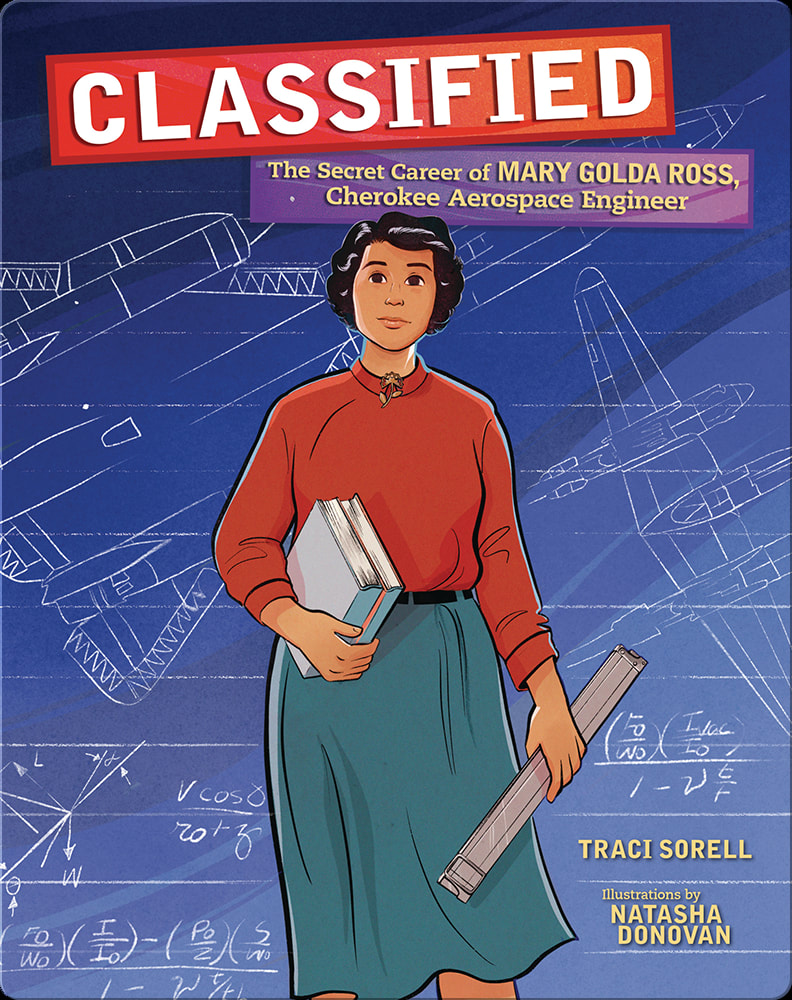 “Do the best you can and search out available knowledge and build on it,” said Mary Golda Ross in April 2008. This quote introduces and frames Classified: The Secret Career of Mary Golda Ross, Cherokee Aerospace Engineer, Cherokee author Traci Sorell’s and Métis illustrator Natasha Donovan’s 2021 picture book biography featured this month on The Biography Clearinghouse. Known as “Gold” to her family, Mary Golda Ross was a pioneer in multiple ways. A trained mathematician and educator-turned-engineer, she was the first female and the first Native American aerospace engineer in the United States. Mary’s intellect and penchant for problem-solving were invaluable as she helped research and design satellites, missiles, and rockets. Her work, much of which is still classified, was integral to the U.S. development of its aerospace program in the mid-20th century. Like many women entering traditionally male-dominated fields, Mary is considered a “Hidden Figure.” Fortified by her independence and tenacity, Mary carved out historical and professional space that had rarely—if ever—included women and minorities. And in doing so, Mary helped revolutionize our relationship with space. Independent and tenacious, Mary was the great-great-grandaughter of John Ross, the Cherokee Chief who led his people during and after they were forced to abandon their ancestral lands in the Southeast. Their migration to what is now Oklahoma, is known as the Trail of Tears. Throughout her career, Mary relied on her Cherokee values for guidance, and she credited her professional success to those values. Sorell uses these values to “bookend” Mary’s story. On the first opening spread, a red box catches the reader’s attention. Within it, Sorell informs the reader that Cherokee values are not written down, but rather passed down through generations of family members. The core values that shaped Mary’s life were “gaining skills in all areas of life (both within and out of the classroom), working collaboratively with others, remaining humble when others recognize your talents, and helping ensure equal education and opportunity for all” (p.2). These values ground the reader and serve as a preview to Mary’s life. At the conclusion of the book, Sorell returns to those values, offering readers the four values in the Cherokee syllabary, a transliteration, pronunciation, and then finally, English translation. Illustrator Natasha Donovan visually moves the reader through Mary’s life with a series of shifting images digitally rendered, ranging from close-ups of Mary’s classrooms to a bird’s eye view of her travels, zooming out to the larger vistas within her mind as she imagined and designed, zooming in on the many hands around a table working collaboratively to bring these inventions into existence. The illustrations highlight the tensions and opportunities that Mary encounters, and the role she played in an emerging field. Mary’s unique circumstances prompted her to reach out and mentor many women in science and mathematics across her long career. She traveled to high schools to mentor college bound seniors and advocate education in engineering and mathematics, and also advocated for career opportunities for fellow Native American and Alaska Natives. Across her career, Mary worked closely with so many - from scientists working in secret on cutting edge technology to young adults just beginning to build their professional identities. So far, 2021 has shown us the power and potential of science, from the COVID-19 vaccines that continue to be distributed across the globe to the ever-changing understanding of the virus’ variants. Scientists have modeled the ways in which their work is always collaborative. In contrast, 2021 has also shown us the power of the extremely wealthy to appropriate science and technology that has been developed for the benefit of the nation. The two richest men in the world, Jeff Bezos and Elon Musk, turned space travel into their personal pleasure. Was that part of Mary’s vision of interplanetary travel? Or was hers something more equitable, more in line with her Cherokee values of inclusivity and work for the common good?
Exploring ValuesFrom the first pages of the book to the last, author Traci Sorell affirms the significance of Cherokee values in Mary Golda Ross’s life. We discuss this in our interview with Traci and refer both to the red box that names Cherokee values on the verso page, as well as the information on Cherokee values in the backmatter. After reading Classified, ask students to share their understanding of what the word “values” means. Then ask students to share their understanding of the Cherokee values that are represented in the book. How do they define them in their own words? Next, ask students to make a list of the values that are important to them. Provide them with an opportunity to talk to one another in pairs or small groups about their values. How are their values similar and different from one another? How are the words they use to describe their values similar and different from one another? After they’ve had a chance to do this, allow them time to consider where their values come from. Are they influenced by the grown-ups in their lives? Their community? Their religion? Are their values influenced by their family cultural heritage(s), race, or ethnicity(ies)? How do their education influence their values, and how do their values influence their education? Finally, ask students to look again at the four Cherokee values discussed in the back matter. What connections do students see between the values discussed in their group and the Cherokee values that guided Mary’s life? Mentoring Others Mary Golda Ross was known for the mentoring work she did, supporting younger women and indigenous women entering the field of STEM. What kind of mentoring exists in your school? In the lives of your students and their families? In your community?
The Space Race as Collaboration As an aerospace engineer, Mary Golda Ross worked on the top-secret Skunk Works Project of Lockheed Martin. As Sorell writes in Classified, Skunk Works research contributed to the Apollo space missions and the eventual moon walk by U.S. astronauts in 1969. You can show students an example of her work: Planetary Flight Handbook, No. 9, NASA. What other women were involved in Space Race research? After reading Classified, provide time for students to explore these other books about the Space Race.
In Classified, Sorrell notes that “whenever Mary received awards, she always thanked her colleagues because she knew no one person deserved credit for what everyone had done together.” As students explore whichever permutation of texts you select, ask them to consider the ways in which teamwork is represented. In what ways are individuals featured? In what ways is their collective and collaborative work represented? Use this conversation as an opportunity to discuss the process of “doing science” as collaborative rather than singular work. This can also serve as a springboard to critical considerations regarding the ways inventions and scientific breakthroughs are often attributed to specific individuals instead of to the team as a whole, changing our understanding of what makes change possible. Change happens when groups of people work together over time. To see more classroom possibilities and helpful resources connected to Classified: The Secret Career of Mary Golda Ross, Cherokee Aerospace Engineer, visit The Biography Clearinghouse. Additionally, we’d love to hear how the interview and these ideas inspired you. Email us at [email protected] with your connections, creations, and questions. Mary Ann Cappiello teaches courses in children’s literature and literacy methods at Lesley University, blogs about teaching with children’s literature at The Classroom Bookshelf, a School Library Journal blog, and is a former chair of NCTE’s Orbis Pictus Award for Outstanding Nonfiction K-8.
Donna Sabis-Burns, Ph.D., an enrolled citizen of the Upper Mohawk-Turtle Clan, is a Group Leader in the Office of Indian Education at the U.S. Department of Education* in Washington, D.C. She is a Board Member (2020-2022) with the Children's Literature Assembly, Co-Chair of the Diversity, Equity, and Inclusivity Committee, and Co-Chair of the 2021 CLA Breakfast meeting (NCTE). *The views expressed herein do not necessarily represent the positions or policies of the U.S. Department of Education. No official endorsement by the U.S. Department of Education of any product, commodity, service, or enterprise mentioned herein is intended or should be inferred. FOR CLA MEMBERS
CLA Board of Directors Elections
BY RAVEN N. CROMWELL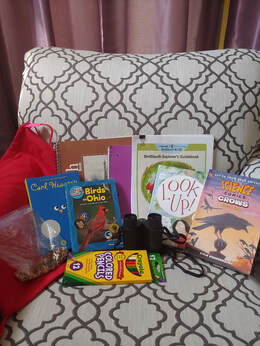 After a four-year hiatus, Marietta College in Marietta, Ohio brought back their summer reading camp in June of 2019. Summer Reading Camp was a three-week, half-day program, sponsored by Marietta College Education Department, designed to assist students in the development of improved reading abilities, oral and written communication skills, and positive attitudes toward reading. Children’s literature and hands-on experiences were the primary instructional tools and camp activities were based around the book The Wild Robot by Peter Brown. Camp was held on campus where students worked in small groups with undergraduate students and local teachers. Priority for camp was given to students who had been recommended for additional literacy instruction by their school. Following our successful return, we decided to revamp our camp to make it even more appealing and helpful to our local families for 2020. We redesigned camp to be full-day in order to provide more reading instruction time and to make the schedule easier to manage for working families. We also expanded our focus to other content areas, renaming the program STREAM camp, which stands for Science, Technology, Reading, Engineering, Art, and Math. This new vision still included high interest books, activities, and reading instruction. However, students would also practice their reading skills and strategies in content-rich texts. Before we could implement STREAM camp, however, we were faced with the global pandemic.
This summer we once again had to place our in-person camp on hold due to the pandemic, and again provide Summer Reading Adventure Packs. Generous contributions from the local community have allowed us to provide 320 packs to local schools for 2021. Additionally, we are listing the selected books and accompanying activities on our website (mcstreamcamp.com) for parents and caregivers who did not receive a pack, but would like to provide this as an enrichment activity for their children. We also created a YouTube channel that features community members reading the books featured in the packs. It is our hope that the reading packs will inspire children to continue to read, explore, and create during the summer in order to be better prepared for their eventual return to the classroom. “The thought of putting these activities together for students is amazing. This is allowing us as a college the opportunity to grow and reach out to the community. It is also helping students continue to grow and learn in a fun way over summer!” —Hannah, a 2021 graduate, who is working on a pet-themed pack for grades K-1 “Did you know that there are robots all around and that you are using aspects of coding to complete everyday tasks? The fourth and fifth-grade students will build their own robot, practice simple coding through giving directions, and even develop their own code with Legos. Through the books and activities the students will get a behind-the-scenes look at the technology that makes up so much of our lives while they develop problem solving skills.” —Elissa, a future graduate, who is working on a STEM-themed pack for grades 4-5 If you are interested in creating your own literacy packs, you should check out the wonderful resources provided by Reading Rockets. They have articles that include why these packs are important and how to create your own. They provide free, downloadable activities and list the companion books you can purchase on your own or check out from your local library. They even have a program called Start with a Book that allows you to explore titles and activities based around several high-interest, content-rich topics. This website also contains helpful hints and instructional videos for caregivers to nurture reading skills and reading motivation in children. We hope that in 2022 STREAM Camp will return to Marietta, improved by the lessons we learned during the pandemic. Resources from Reading Rockets
Raven N. Cromwell works in the Education Department at Marietta College in Marietta, Ohio. Her research interests include diverse children’s literature and pre-service education. Raven is a member of CLA’s Ways and Means Committee. By Kathryn Will, Meghan Goodwin, and Sophie HendrixThe Notable Children’s Books in Language Arts Committee (NCBLA), reads, reviews, and discusses over 400 books of various genres written for K-8 children each year. These works of poetry and prose are analyzed using the charge of the committee that asks in making the selection of the top thirty texts the seven committee members consider: 1. Appealing format, 2. Enduring quality, 3. Exemplary quality for their genre, and 4. Meeting one or more of the following: a. Use of language: play on words, word origins, history of language b. Uniqueness in use of language or style c. Invitation of child response or engagement This post focuses on two of the texts from the 2020 Notables List that might be seen through the lens of a progression from small to large. Although The Magic of Letters (2019) and Small World (2019) are very different books, they can be used to invite readers to imagine, play, and wonder. The Magic of Letters
Written by Tony Johnston Illustrated by Wendell Minor Penguin Random House, unpaged, ISBN 978-0823441594
Small World
Written by Ishta Mercurio Illustrated by Jen Corace Abrams Books for Young Readers, unpaged, ISBN 978-1419734076
Teaching Tips Both of these books invite readers to engage in exploration and discussion through multiple reads due to their rich vocabulary and use of language. Teachers can easily deepen and extend the texts through a variety of activities. Using the illustrative style of The Magic of Letters, children could repurpose magazines and catalogues to cut out letters and words as sources for creating new words and sentences. As they pore over the texts, they could look for familiar and known letters and words, providing opportunities for practice in letter and word recognition before assembling them in a collage. Children could use crayon resist to create magic letters of their very own, or even play roll and write to create sentences from familiar and new words. These activities reflect the rich and playful nature of the text. Small World is a text that envelopes the reader in the world of STEAM (Science, Technology, Engineering, Art, and Math). The rich vocabulary begs teachers to consider connections to geometry, snow science, and roller coasters. With consideration of Nanda’s career as an astronaut, students might watch this video about women astronauts, or think about materials they might need for a trip to the moon. This book also holds opportunities for rich discussion with questions such as:
Kathryn Will is an Assistant Professor of Literacy at the University of Maine Farmington (@KWsLitCrew). She is passionate about sharing the power of children's literature with her students, including the two listed below who assisted in the creation of the teaching tips shared. She is a member of the 2019 Notables Committee, and will be chairing the committee in the upcoming year. Meghan Goodwin, Preservice teacher, University of Maine Farmington (@Ms_G_Teaches) Sophie Hendrix, Preservice teacher, University of Maine Farmington |
Authors:
|
CLA
About CLA
|
Journal of Children's Literature
Write for JCL
|
ResourcesCLA-sponsored NCTE Position Statements
|
Members-Only Content
CLA Video Library
|
© COPYRIGHT 2018.
ALL RIGHTS RESERVED |



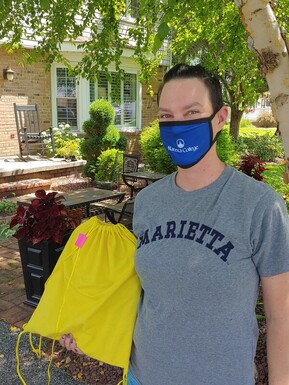
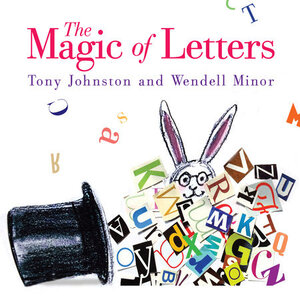
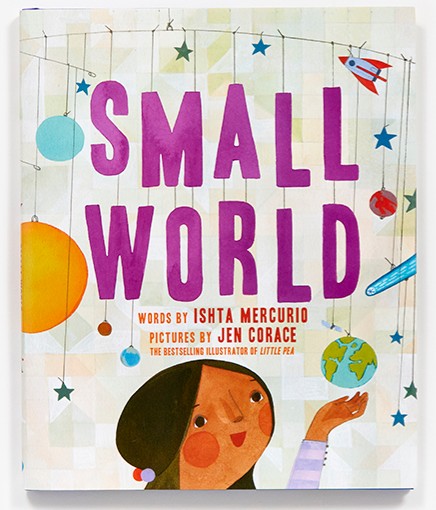
 RSS Feed
RSS Feed